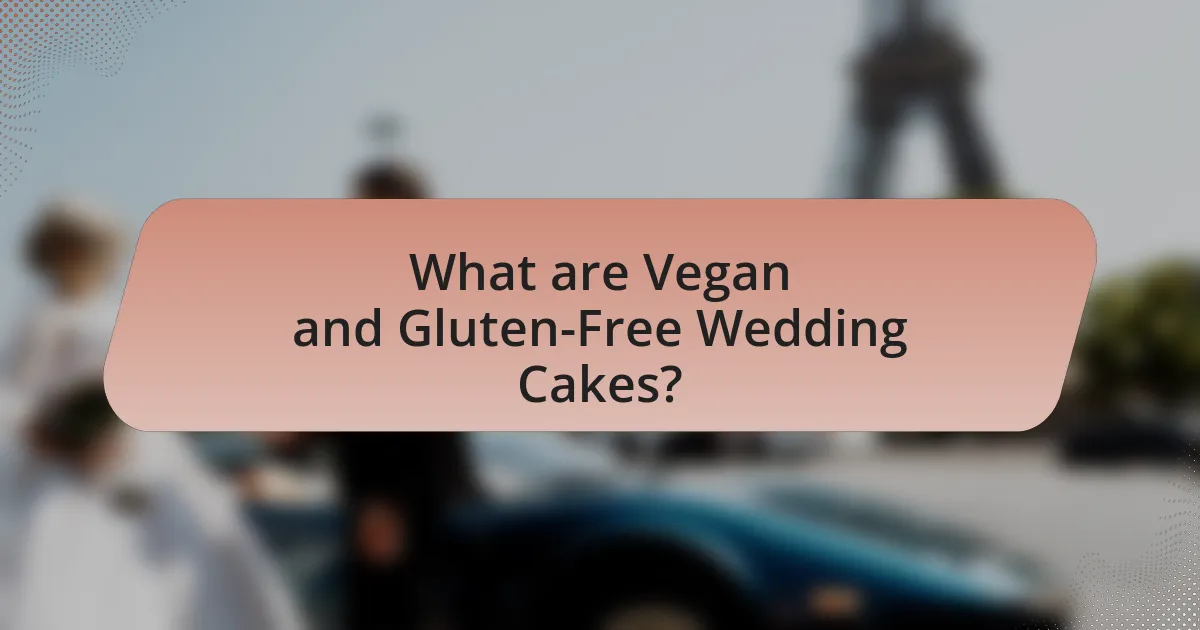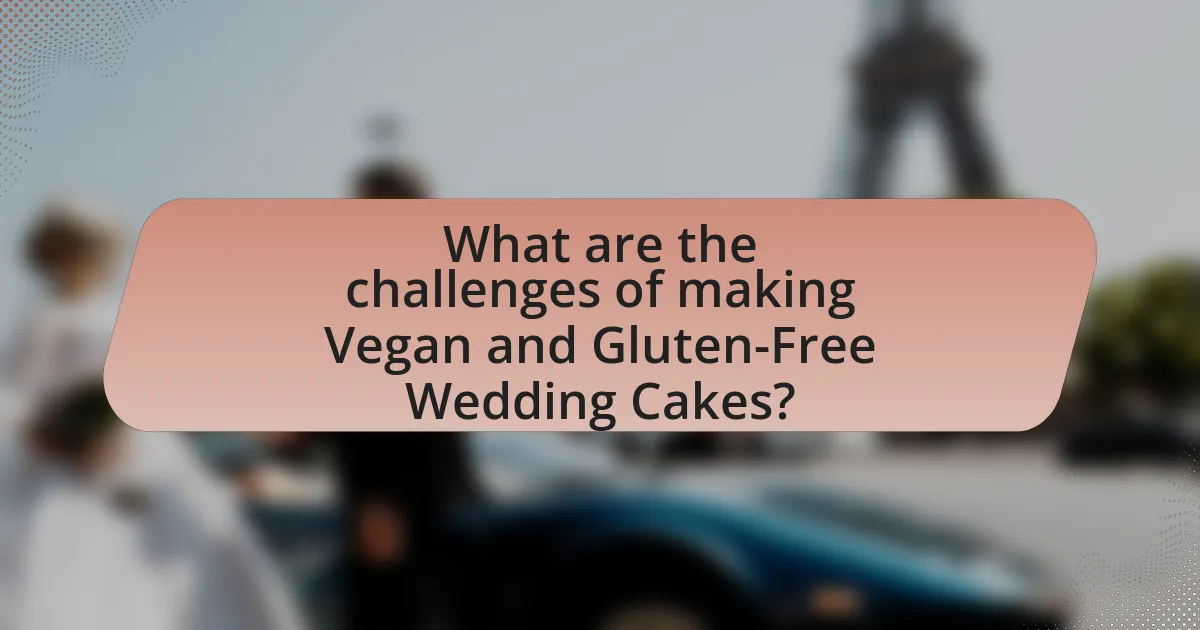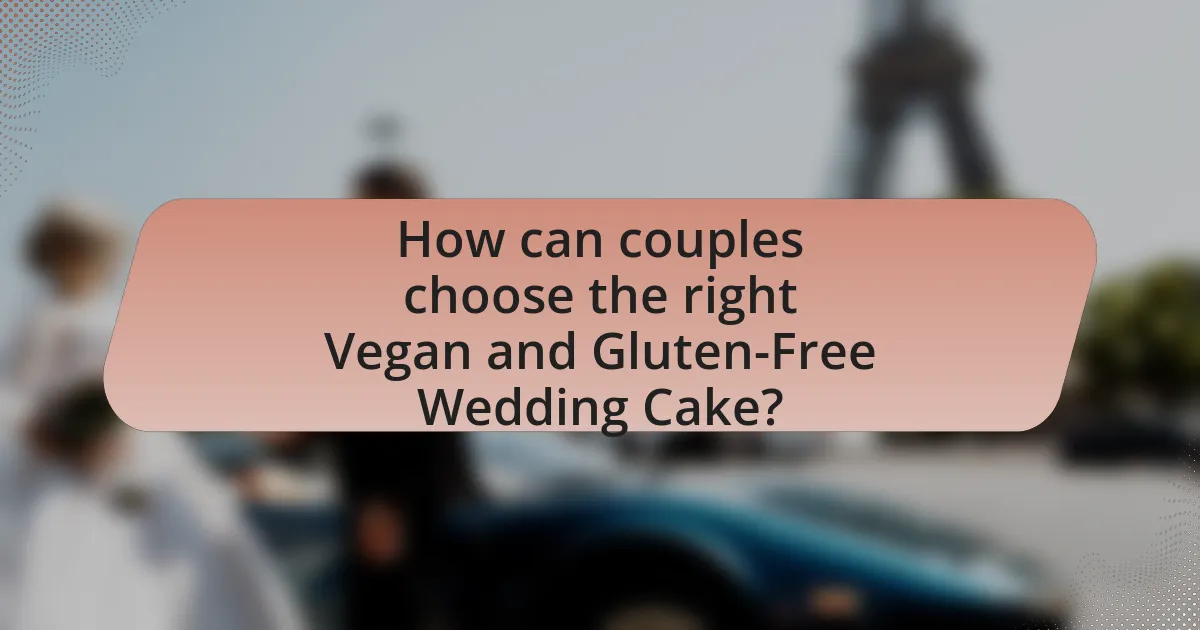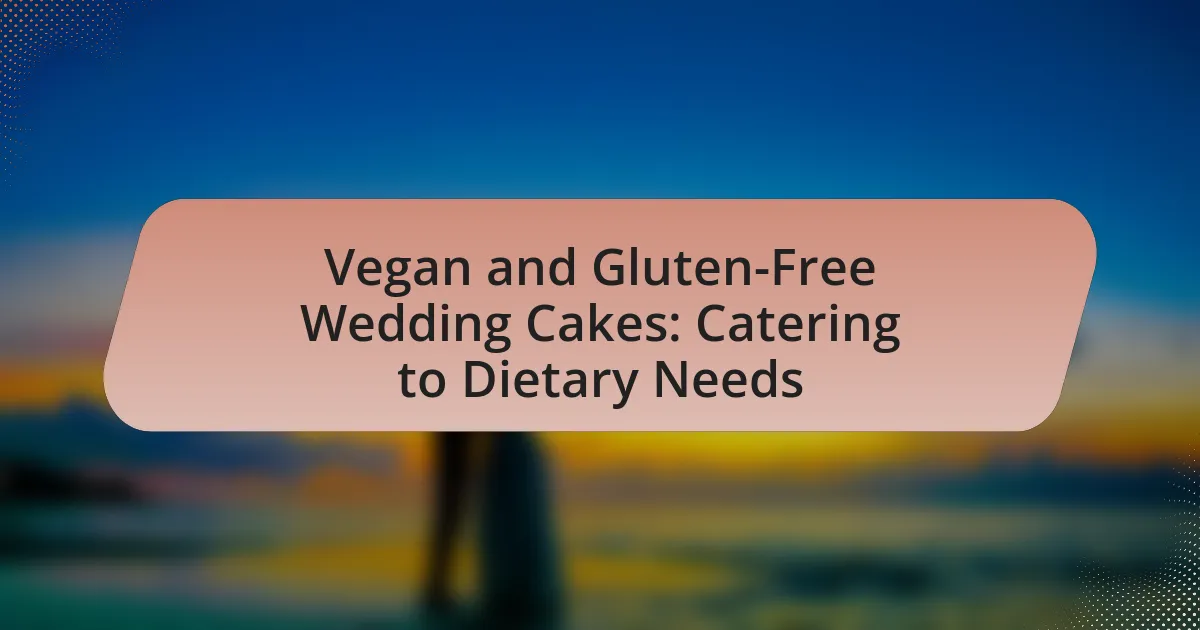Vegan and gluten-free wedding cakes are specially crafted desserts that cater to individuals with dietary restrictions, excluding animal products and gluten. These cakes utilize alternative ingredients such as almond flour, coconut flour, and plant-based substitutes for eggs and dairy, ensuring they meet the needs of those with celiac disease or following a vegan lifestyle. The article explores the differences between these cakes and traditional options, the ingredients commonly used, and the challenges bakers face in creating them. Additionally, it highlights the growing popularity of vegan and gluten-free cakes due to increasing awareness of dietary needs and societal trends towards healthier eating. Couples are provided with guidance on selecting the right cake, ensuring it meets their guests’ dietary requirements while maintaining flavor and texture.

What are Vegan and Gluten-Free Wedding Cakes?
Vegan and gluten-free wedding cakes are desserts specifically designed to meet the dietary restrictions of individuals who avoid animal products and gluten. These cakes are made without traditional ingredients such as eggs, dairy, and wheat flour, often utilizing alternatives like almond flour, coconut flour, or gluten-free blends, along with plant-based substitutes for eggs and dairy. The growing demand for such cakes is supported by statistics indicating that approximately 1 in 100 people have celiac disease, necessitating gluten-free options, while the vegan lifestyle has seen a significant rise, with a 600% increase in the number of people identifying as vegan in the past three years.
How do Vegan and Gluten-Free Wedding Cakes differ from traditional cakes?
Vegan and gluten-free wedding cakes differ from traditional cakes primarily in their ingredients, as vegan cakes exclude all animal products while gluten-free cakes eliminate gluten-containing grains. Traditional cakes typically contain eggs, dairy, and wheat flour, which contribute to their texture and flavor. In contrast, vegan cakes often use plant-based substitutes like applesauce or flaxseed for binding and almond or coconut milk for moisture, while gluten-free cakes utilize alternative flours such as almond, coconut, or rice flour to achieve a similar consistency. This distinction is crucial for accommodating dietary restrictions, as approximately 1 in 100 people have celiac disease, necessitating gluten-free options, and many individuals choose vegan diets for ethical or health reasons.
What ingredients are typically used in Vegan and Gluten-Free Wedding Cakes?
Vegan and gluten-free wedding cakes typically use ingredients such as almond flour, coconut flour, or gluten-free all-purpose flour as the base, along with plant-based milk, such as almond or soy milk, and natural sweeteners like maple syrup or agave nectar. These cakes often incorporate ingredients like applesauce or flaxseed meal as egg substitutes to provide moisture and binding. Additionally, they may include baking powder, vanilla extract, and various fruits or nuts for flavor and texture. The use of these specific ingredients ensures that the cake meets both vegan and gluten-free dietary requirements, making it suitable for a wider range of guests.
How do these ingredients affect the taste and texture of the cake?
Vegan and gluten-free ingredients significantly influence the taste and texture of the cake. For instance, almond flour, commonly used in gluten-free baking, adds a nutty flavor and moist texture, while coconut oil contributes richness and a subtle sweetness. Additionally, plant-based milk alternatives, such as almond or oat milk, enhance moisture without dairy, impacting the overall mouthfeel. The use of flaxseed or chia seeds as egg substitutes provides binding properties, which can improve the cake’s structure and prevent crumbling. These ingredients collectively create a cake that is flavorful and has a desirable texture, aligning with the expectations of wedding cakes while accommodating dietary restrictions.
Why are Vegan and Gluten-Free Wedding Cakes becoming popular?
Vegan and gluten-free wedding cakes are becoming popular due to the increasing awareness of dietary restrictions and preferences among couples and their guests. As more people adopt veganism and gluten-free diets for health, ethical, or lifestyle reasons, the demand for inclusive dessert options has risen. According to a 2021 survey by The Knot, 30% of couples reported accommodating dietary restrictions in their wedding planning, highlighting the importance of offering diverse food choices. This trend reflects a broader societal shift towards healthier and more sustainable eating habits, making vegan and gluten-free cakes not only a thoughtful choice but also a practical one for modern weddings.
What dietary needs do these cakes cater to?
These cakes cater to vegan and gluten-free dietary needs. Vegan cakes exclude all animal products, making them suitable for individuals following a plant-based diet, while gluten-free cakes are formulated without wheat or gluten-containing ingredients, accommodating those with celiac disease or gluten intolerance. This dual focus ensures that both dietary restrictions are addressed, allowing a wider range of guests to enjoy the wedding celebration without health concerns.
How do societal trends influence the demand for these cakes?
Societal trends significantly influence the demand for vegan and gluten-free wedding cakes as more consumers prioritize health, sustainability, and inclusivity in their dietary choices. The increasing awareness of dietary restrictions, such as gluten intolerance and veganism, has led to a rise in the number of couples seeking wedding cakes that accommodate these needs. According to a 2021 survey by The Knot, 25% of couples reported considering dietary restrictions when planning their wedding menus, reflecting a shift towards more inclusive options. Additionally, the trend towards plant-based diets, driven by environmental concerns and health benefits, has further propelled the demand for vegan cakes. This shift is supported by a report from Grand View Research, which indicates that the global vegan dessert market is expected to grow significantly, highlighting the increasing consumer preference for plant-based alternatives.

What are the challenges of making Vegan and Gluten-Free Wedding Cakes?
Making vegan and gluten-free wedding cakes presents challenges primarily due to the need for ingredient substitutions that maintain taste and texture. Traditional cake ingredients like eggs and gluten-containing flours are replaced with alternatives such as flaxseed meal or aquafaba for binding, and gluten-free flours like almond or coconut flour, which can alter the cake’s structure and moisture content.
These substitutions often lead to difficulties in achieving the desired rise and crumb, as gluten provides elasticity and structure. Additionally, balancing flavors can be complex, as some gluten-free flours have distinct tastes that may not complement traditional cake flavors.
Moreover, ensuring that the cake remains moist without the fat content typically found in dairy products can be challenging, requiring careful formulation of wet ingredients. The need for cross-contamination prevention in kitchens that handle gluten can also complicate the baking process, as strict adherence to gluten-free standards is essential for safety.
How can bakers overcome common baking challenges?
Bakers can overcome common baking challenges by utilizing alternative ingredients and adjusting techniques to accommodate dietary restrictions. For instance, when baking vegan cakes, bakers can replace eggs with flaxseed meal or applesauce, which serve as effective binding agents. Similarly, for gluten-free cakes, using a blend of gluten-free flours, such as almond flour and coconut flour, can provide the necessary texture and flavor. Research indicates that the right combination of these flours can yield a cake that is both moist and structurally sound, addressing the common issue of dryness in gluten-free baking. Additionally, incorporating ingredients like xanthan gum can help mimic the elasticity of gluten, further enhancing the cake’s quality.
What substitutions can be made for traditional ingredients?
For traditional ingredients in vegan and gluten-free wedding cakes, common substitutions include using almond flour or coconut flour instead of wheat flour, and applesauce or mashed bananas in place of eggs. These alternatives provide similar textures and moisture while adhering to dietary restrictions. Almond flour contains healthy fats and protein, while coconut flour is high in fiber, making them suitable for gluten-free baking. Applesauce and mashed bananas not only act as binding agents but also add natural sweetness, which is beneficial for reducing added sugars in recipes.
How can texture and flavor be enhanced in these cakes?
Texture and flavor in vegan and gluten-free wedding cakes can be enhanced by incorporating ingredients such as almond flour, coconut flour, or aquafaba. Almond flour adds moisture and a nutty flavor, while coconut flour provides a light texture and absorbs excess liquid, creating a denser cake. Aquafaba, the liquid from canned chickpeas, acts as an egg substitute, contributing to a fluffier texture and improved rise. Additionally, using natural flavor enhancers like vanilla extract, citrus zest, or spices can elevate the overall taste profile. Studies show that the combination of these ingredients can significantly improve the sensory qualities of gluten-free baked goods, making them more appealing to consumers.
What are the best practices for decorating Vegan and Gluten-Free Wedding Cakes?
The best practices for decorating vegan and gluten-free wedding cakes include using plant-based ingredients for frosting and decorations, such as aquafaba or coconut cream for whipped toppings, and ensuring that all decorative elements are gluten-free. Additionally, utilizing natural food colorings from fruits and vegetables can enhance the visual appeal without compromising dietary restrictions. It is essential to verify that all decorations, including fondant and edible glitter, are certified vegan and gluten-free to maintain compliance with dietary needs. These practices ensure that the cake not only meets dietary requirements but also remains visually stunning and delicious.
What types of vegan and gluten-free frosting options are available?
Vegan and gluten-free frosting options include coconut cream frosting, avocado chocolate frosting, and cashew cream frosting. Coconut cream frosting is made from whipped coconut cream and is naturally gluten-free and vegan. Avocado chocolate frosting combines ripe avocados with cocoa powder and sweeteners, providing a rich, creamy texture without dairy or gluten. Cashew cream frosting is created by blending soaked cashews with sweeteners and flavorings, resulting in a smooth and versatile frosting suitable for various desserts. These options cater to dietary needs while maintaining flavor and texture.
How can decorations be made to complement the cake’s dietary requirements?
Decorations can be made to complement a cake’s dietary requirements by using ingredients that align with those specific needs, such as vegan and gluten-free options. For instance, edible decorations like fruits, nuts, and seeds can enhance the visual appeal while adhering to vegan and gluten-free standards. Additionally, using plant-based food colorings and gluten-free edible glitters ensures that all decorative elements are safe for those with dietary restrictions. This approach not only maintains the integrity of the cake’s dietary requirements but also provides a visually appealing presentation that aligns with the overall theme of vegan and gluten-free wedding cakes.

How can couples choose the right Vegan and Gluten-Free Wedding Cake?
Couples can choose the right vegan and gluten-free wedding cake by prioritizing their specific dietary needs and preferences while researching reputable bakers who specialize in these types of cakes. It is essential to request tastings from multiple bakers to evaluate flavor and texture, ensuring that the cake meets both vegan and gluten-free standards. Additionally, couples should inquire about the ingredients used, confirming that no animal products or gluten-containing ingredients are included, as well as checking for cross-contamination practices. Research shows that many bakeries now offer a variety of options that cater to these dietary restrictions, making it easier for couples to find a suitable cake that aligns with their values and tastes.
What factors should be considered when selecting a cake?
When selecting a cake, key factors include dietary restrictions, flavor preferences, and design requirements. Dietary restrictions are crucial, especially for vegan and gluten-free options, as they ensure that all guests can enjoy the cake without health concerns. Flavor preferences should align with the couple’s taste and the event’s theme, as popular flavors can enhance the overall experience. Design requirements involve aesthetic considerations, such as color schemes and styles, which should complement the wedding’s decor. These factors collectively ensure that the cake meets the needs and expectations of the event while accommodating specific dietary needs.
How can couples ensure their cake meets their guests’ dietary needs?
Couples can ensure their cake meets their guests’ dietary needs by communicating with their guests about specific dietary restrictions and preferences prior to the event. This proactive approach allows couples to gather information on allergies, intolerances, and dietary choices, such as vegan or gluten-free requirements. Additionally, couples should collaborate with a baker experienced in creating customized cakes that cater to these dietary needs, ensuring that the ingredients used are safe and suitable for all guests. Research indicates that 32% of people have dietary restrictions, highlighting the importance of this consideration in event planning.
What role does taste testing play in the selection process?
Taste testing plays a critical role in the selection process of vegan and gluten-free wedding cakes by allowing couples to evaluate flavor, texture, and overall satisfaction before making a final decision. This hands-on experience ensures that the chosen cake meets the dietary preferences and expectations of both the couple and their guests, which is particularly important given the unique challenges of creating delicious vegan and gluten-free options. Research indicates that sensory evaluation, including taste testing, significantly influences consumer choices, as it provides direct feedback on product quality and palatability, ultimately guiding couples toward a cake that aligns with their vision for their wedding celebration.
What tips can help in planning a Vegan and Gluten-Free Wedding Cake?
To plan a Vegan and Gluten-Free Wedding Cake, focus on using alternative flours such as almond, coconut, or gluten-free blends, and incorporate plant-based binders like flaxseed meal or applesauce. These ingredients ensure the cake meets both dietary requirements while maintaining texture and flavor. Additionally, consider using natural sweeteners like maple syrup or agave nectar, which complement vegan recipes. Research indicates that gluten-free cakes can be successfully made with these ingredients, as demonstrated in various baking studies that highlight the effectiveness of alternative flours and binders in achieving desirable cake qualities.
How can couples communicate their dietary needs to their baker?
Couples can communicate their dietary needs to their baker by providing a clear and detailed list of specific requirements, such as vegan or gluten-free preferences. This ensures that the baker understands the exact ingredients to avoid and the desired alternatives to use. For instance, couples should specify if they require dairy-free substitutes, egg replacements, or gluten-free flours, which are essential for creating a cake that meets their dietary restrictions. Clear communication helps prevent misunderstandings and ensures that the final product aligns with the couple’s dietary needs.
What are some common misconceptions about Vegan and Gluten-Free cakes?
Common misconceptions about vegan and gluten-free cakes include the belief that they lack flavor and texture compared to traditional cakes. In reality, many vegan and gluten-free cakes utilize alternative ingredients like almond flour, coconut flour, and natural sweeteners, which can enhance flavor and moisture. Additionally, some people think that these cakes are always unhealthy; however, they can be made with wholesome ingredients that provide nutritional benefits, such as fruits, nuts, and seeds. Another misconception is that vegan and gluten-free cakes are difficult to make; in fact, numerous recipes exist that simplify the process, making them accessible for home bakers.
